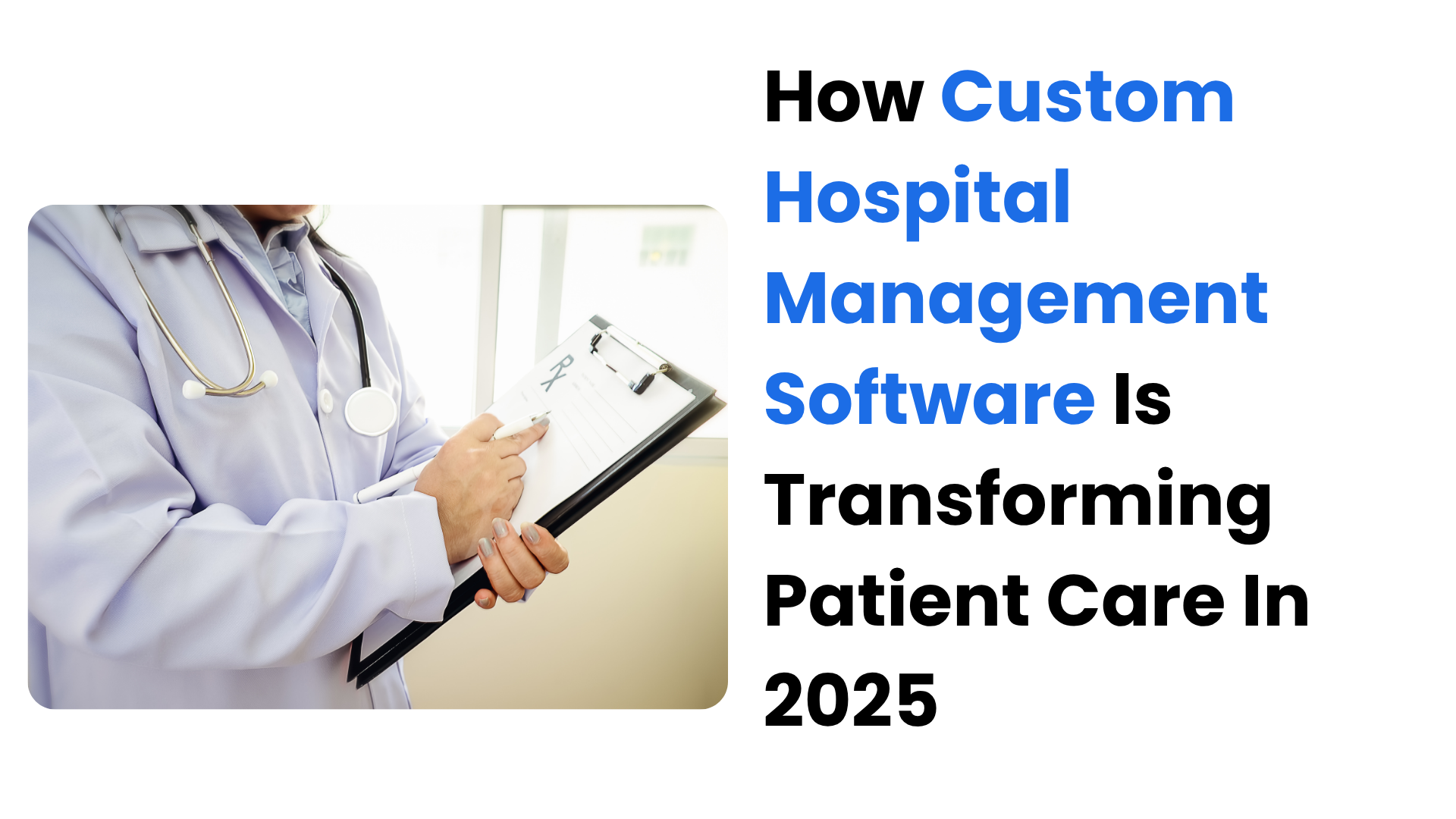The healthcare industry is undergoing a dramatic shift in 2025. With the rise of digital technologies, hospitals are no longer relying on generic software systems. Instead, they are investing in custom hospital management software to streamline operations, improve accuracy, and most importantly, deliver personalized and efficient patient care.
While traditional software might meet some general needs, today’s hospitals require more tailored solutions to handle complex workflows and fast-evolving patient expectations. That’s where a custom healthcare software development company plays a crucial role, offering technology built around real clinical challenges.
The Growing Need for Digital Transformation in Healthcare
Healthcare organizations are now expected to deliver faster service, secure patient data, coordinate across departments, and meet stringent regulatory requirements. Manual processes and disconnected legacy systems are no longer sustainable.
This rising demand for innovation is being fulfilled by:
* Custom software development services that cater to hospital-specific needs
* Advanced healthcare IT solutions that enhance operational efficiency
* Scalable platforms for managing hospital-wide activities from a single interface
What Makes Custom Hospital Software Different?
|
Aspect |
Generic HMS |
Custom HMS |
|
Flexibility |
Fixed modules |
Modular, adaptable to hospital workflow |
|
Integration Capabilities |
Limited |
Easy integration with labs, pharmacies, payment gateways, etc. |
|
Compliance |
Often lacks regional compliance support |
Built to meet HIPAA, HL7, GDPR, and country-specific health regulations |
|
User Experience |
Basic interfaces |
Optimized for different user groups (doctors, nurses, admins, patients) |
|
Long-term ROI |
Higher licensing cost |
Full ownership and scalable with hospital growth |
Custom systems are built by analyzing the institution’s operational gaps and creating functionality that fits like a glove—improving productivity and enhancing patient experiences.
Key Ways Custom HMS Is Transforming Patient Care
Here’s how hospitals are elevating patient services in 2025 using custom software:
1. Efficient Patient Registration & Scheduling
* Streamlined onboarding with minimal paperwork
* Intelligent scheduling reduces patient wait time
* Auto-reminders reduce no-shows
2. Real-Time EHR Access
* Doctors and nurses get centralized access to patient records, improving treatment decisions
* Integration with diagnostic labs for auto-synced test results
3. Medication & Treatment Safety
* Digital prescriptions and alerts reduce medical errors
* System-driven checks for allergies, dosage conflicts, or past history
4. Remote Consultations & Monitoring
* Built-in telemedicine features for remote consultations
* Integration with wearable IoT devices for chronic care management
5. Enhanced Communication & Patient Portal
* Patients can:
i) View lab reports
ii) Book/reschedule appointments
iii) Chat with doctors
iv) Pay bills online
v) This boosts engagement, transparency, and satisfaction
Technologies Powering Hospital Software in 2025
Modern hospital systems go beyond management—they’re intelligent and predictive, thanks to technologies such as:
* Artificial Intelligence (AI): For early diagnosis, risk scoring, and decision support
* IoT Integration: Real-time vitals and alerts from medical devices
* Blockchain: Secures sensitive medical data and prevents tampering
* Cloud-Based Architecture: Enables remote access, data backup, and scalability
* RPA (Robotic Process Automation): Automates repetitive admin tasks such as billing and inventory
A reputable custom healthcare software development company can help hospitals harness these technologies effectively.
Common Modules in Custom Hospital Management Software
Here’s a breakdown of the key components you can expect:
|
Module |
Function |
|
Patient Management |
Handles registration, records, and appointment schedules |
|
EHR System |
Consolidates patient history, treatment plans, and prescriptions |
|
Laboratory Integration |
Automates lab order placements and result tracking |
|
Pharmacy Management |
Manages drug inventory and tracks prescriptions |
|
Billing & Insurance |
Handles invoicing, claims processing, and insurance validation |
|
Telemedicine |
Enables virtual consultation and video calls |
|
Staff & Duty Management |
Manages schedules, shifts, and roles of hospital staff |
|
Analytics & Reporting |
Provides dashboards on patient metrics, revenue, and performance |
These modules work together to build an efficient, responsive, and data-driven care environment.
Role of Software Development Consulting in Healthcare Transformation
Before jumping into development, hospitals need strategic guidance. This is where software development consulting services add immense value. A consulting firm helps:
* Identify the gaps in your existing workflows
* Choose the right technologies for your goals
* Prioritize features based on budget and scalability
* Ensure compliance with regional regulations
* Build a roadmap for long-term transformation
By combining technical know-how with domain knowledge, consultants set a strong foundation for success.
Benefits of Custom Software for Hospitals
For Hospitals:
* Streamlined processes
* Centralized information flow
* Reduction in manual errors
* Faster billing cycles and insurance handling
* Better resource utilization
For Patients:
* Improved communication with doctors
* Reduced wait times
* Personalized care plans
* Access to personal health data anytime
* Convenience in scheduling and payments
Choosing the Right Development Partner
Your transformation journey depends heavily on selecting the right . Look for:
* Industry expertise and healthcare project portfolio
* Compliance knowledge (HIPAA, HL7, etc.)
* Ability to integrate with legacy systems
* Scalable architecture and cloud experience
* Post-deployment support and training
A technology partner offering both healthcare IT solutions and custom software development services will deliver lasting impact.
Conclusion: Digital-First, Patient-Centric Healthcare Is Here
Custom hospital management software is not just an operational upgrade—it's a strategic enabler of better patient care, improved hospital efficiency, and stronger outcomes. In 2025 and beyond, hospitals that embrace tailored solutions will lead the charge in delivering safe, smart, and scalable healthcare.
If you’re planning to elevate your hospital's infrastructure, now is the time to explore custom software development services that bring your vision to life.

















Post Comments